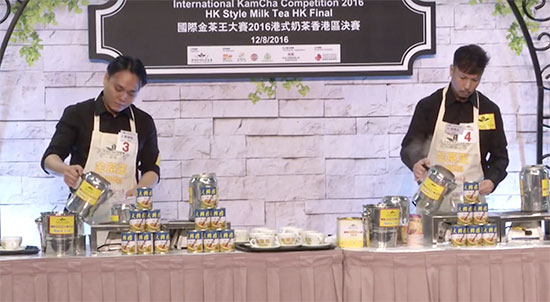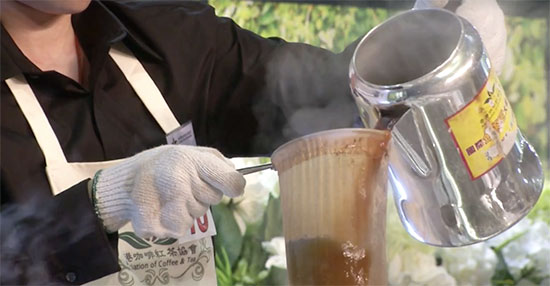Hong Kong’s Milk Tea Competition Looks Fun as Heck
What exactly is milk tea, and why do Hong Kongers go so nuts for it?
Hong Kong’s Milk Tea Competition Looks Fun as Heck
What exactly is milk tea, and why do Hong Kongers go so nuts for it?

Coffee competitions can be fiery and fun; from the Barista Championships to the World Aeropress Championship, they can be raucous, loud affairs. Tea competitions tend to be a little more subtle, more delicate – unless you’re in Hong Kong. This year’s Hong Kong-style milk tea competition was captured on camera by Reuters, and man, would we like to be there.
Hong Kong-style milk tea is as fundamental a beverage to Hong Kongers as coffee is to Americans. Far from the grassy green teas or fermented black teas of mainland China, milk tea is as delicious a collision of East and West as you’re likely to find. The specific methods and materials are closely kept secrets of individual diner-like cha chaang tengs, the primary drinking establishments for milk tea, but some of the basics remain the same.
Milk tea is a blend of black teas, combined with a high proportion of either evaporated milk and sugar, or simply sweetened condensed milk. The use of concentrated milk products gives milk tea a very thick, creamy consistency, and a high sugar content makes the beverage a harder, stiffer, bolder drink than many Americans would associate with tea.
The brewing method is also unusual; instead of merely steeping, the black tea and water are simmered, sometimes multiple times, squeezing out extra flavor. That also brings out tannins, which produce a bitter flavor, but the addition of the dairy and sugar mitigate that, lending an extraordinarily strong but smooth flavor. The straining, too, is unique: sometimes Hong Kong-style milk tea is known as “silk stocking milk tea,” as the preferred strainer is a funnel of cloth.


The specifics of temperature, timing, number of steeping procedures, and type and proportion of dairy and sweetener make Hong Kong milk tea as variable a beverage as any coffee beverage.
The tea itself is a blend, the contents of which is often a closely-held secret. One newish cha chaang teng owner gave The Wall Street Journal a sneak peak into his proportions. From the Journal: “As it turns out, the general formula according to his order slip consists of different parts and varieties of Sri Lankan black teas: coarse leaves and stem from Wufa, Debar and Luver teas, and the addition of baby Bopf tea leaves.” Various other sources around the internet suggest all kinds of different blends, including teas from all over the world. One post on Chowhound suggests using English breakfast, Irish breakfast, Pu-Erh, Green Jasmine, Assam, Lapsang Souchong, and even a flavored fruit tea.
A cup of milk tea brewed with all of those teas would be, very literally, the entire world in a cup. East, West, smoked, flavored, fermented, fresh, blended, single-origin. All in one cup.
Given how unique Hong Kong-style milk tea can be, and how active the process of pouring and repouring and boiling and reboiling and blending and mixing the actual brewing is, it’s no surprise that Hong Kong hosts its own milk tea competition. This year’s winner, Chen Chi-ping, has been making milk tea in his native Hong Kong for over two decades – though he doesn’t seem eager to tell anyone his winning recipe.
Follow us

This work is licensed under a Creative Commons Attribution-NoDerivatives 4.0 International License.
Want to republish a Modern Farmer story?
We are happy for Modern Farmer stories to be shared, and encourage you to republish our articles for your audience. When doing so, we ask that you follow these guidelines:
Please credit us and our writers
For the author byline, please use “Author Name, Modern Farmer.” At the top of our stories, if on the web, please include this text and link: “This story was originally published by Modern Farmer.”
Please make sure to include a link back to either our home page or the article URL.
At the bottom of the story, please include the following text:
“Modern Farmer is a nonprofit initiative dedicated to raising awareness and catalyzing action at the intersection of food, agriculture, and society. Read more at <link>Modern Farmer</link>.”
Use our widget
We’d like to be able to track our stories, so we ask that if you republish our content, you do so using our widget (located on the left hand side of the article). The HTML code has a built-in tracker that tells us the data and domain where the story was published, as well as view counts.
Check the image requirements
It’s your responsibility to confirm you're licensed to republish images in our articles. Some images, such as those from commercial providers, don't allow their images to be republished without permission or payment. Copyright terms are generally listed in the image caption and attribution. You are welcome to omit our images or substitute with your own. Charts and interactive graphics follow the same rules.
Don’t change too much. Or, ask us first.
Articles must be republished in their entirety. It’s okay to change references to time (“today” to “yesterday”) or location (“Iowa City, IA” to “here”). But please keep everything else the same.
If you feel strongly that a more material edit needs to be made, get in touch with us at [email protected]. We’re happy to discuss it with the original author, but we must have prior approval for changes before publication.
Special cases
Extracts. You may run the first few lines or paragraphs of the article and then say: “Read the full article at Modern Farmer” with a link back to the original article.
Quotes. You may quote authors provided you include a link back to the article URL.
Translations. These require writer approval. To inquire about translation of a Modern Farmer article, contact us at [email protected]
Signed consent / copyright release forms. These are not required, provided you are following these guidelines.
Print. Articles can be republished in print under these same rules, with the exception that you do not need to include the links.
Tag us
When sharing the story on social media, please tag us using the following: - Twitter (@ModFarm) - Facebook (@ModernFarmerMedia) - Instagram (@modfarm)
Use our content respectfully
Modern Farmer is a nonprofit and as such we share our content for free and in good faith in order to reach new audiences. Respectfully,
No selling ads against our stories. It’s okay to put our stories on pages with ads.
Don’t republish our material wholesale, or automatically; you need to select stories to be republished individually.
You have no rights to sell, license, syndicate, or otherwise represent yourself as the authorized owner of our material to any third parties. This means that you cannot actively publish or submit our work for syndication to third party platforms or apps like Apple News or Google News. We understand that publishers cannot fully control when certain third parties automatically summarize or crawl content from publishers’ own sites.
Keep in touch
We want to hear from you if you love Modern Farmer content, have a collaboration idea, or anything else to share. As a nonprofit outlet, we work in service of our community and are always open to comments, feedback, and ideas. Contact us at [email protected].by Dan Nosowitz, Modern Farmer
September 1, 2016
Modern Farmer Weekly
Solutions Hub
Innovations, ideas and inspiration. Actionable solutions for a resilient food system.
ExploreExplore other topics
Share With Us
We want to hear from Modern Farmer readers who have thoughtful commentary, actionable solutions, or helpful ideas to share.
SubmitNecessary cookies are absolutely essential for the website to function properly. This category only includes cookies that ensures basic functionalities and security features of the website. These cookies do not store any personal information.
Any cookies that may not be particularly necessary for the website to function and are used specifically to collect user personal data via analytics, ads, other embedded contents are termed as non-necessary cookies.